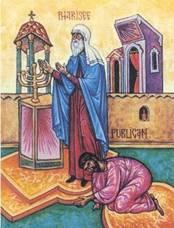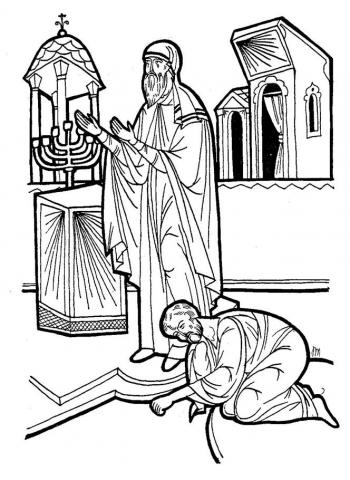Publican and Pharisee
THE PUBLICAN AND THE PHARISEE
 Objectives:
Objectives:
- Students should be able to define “publican” and “Pharisee”.
- Students should know whose prayers God listened to and why.
- Students should note the similarity between the prayer of the publican and the Jesus Prayer, which we pray today.
Possible Lesson Plan:
- Open with prayer.
- Talk a bit about humility: How do you feel when you win a race? Get a prize? Do something good? This feeling is called pride. Some pride is OK. But the Pharisee had done many good things – so many good things that he was always bragging about himself, even to God! Do you ever brag when you do something good? How does it make you feel? How does it make other people feel? Do you feel like you’re better than other people? Does it look that way when you brag? Did the Pharisee think he was better than the publican? Was he in God’s eyes? Have you ever done anything wrong – ever disobeyed God or your parents, cheated in school, hit your brother, yelled at your sister, etc.? None of us is perfect; we all make mistakes. When we pray, should we brag, or should we ask God to help us obey Him even better? Remember the Beatitudes: can anyone recite “Blessed are the poor in spirit…” Which was poor in spirit – the publican or the Pharisee? Which will inherit the kingdom of heaven? The prayer of the publican, felt deep within his heart, and full of the awareness of the greatness of God and his own unworthiness, went straight to heaven; the prayer of the Pharisee certainly went to the ears of those around him! Which left the temple justified?
- Scripture Reference: Luke 18:9-14. What is a publican? Who else have we met who is a tax collector? (Zaccheus and Matthew) Review their stories briefly. What did the publican pray? What is a Pharisee? (a respected man of the temple) What did he pray? Which did God listen to? Why?
- Remind the students of the Jesus Prayer, used by Orthodox Christians today: “Lord Jesus Christ, Son of God, have mercy on me, a sinner.” St. Ignatius (Brianchaninov) states that in this prayer, commended by the Lord Himself, “He later allowed and granted us to pray using His all-holy name…in the New Testament, an expansive completion to the old prayer was presented to man – a new way of praying to the intercessor through Whom the Godhead is united with mankind.” So, when we’re praying the Jesus Prayer, remember the prayer of the publican – completed and even more precious. Review with the students the Jesus Prayer, and be sure each can say it.
- Play a learning game: Publican Says. Line the students up along the wall. Tell them that they will hear a line of a possible prayer, followed by a command. If the prayer would have been that of the publican, they should follow the command, just like in “Simon Says”. But if it’s the Pharisee’s line, they should not follow the command. Of course, just as in Simon Says, the student is “out” if he does the wrong thing. Sample lines (mix them up):
Pharisee: God I thank thee that I am not like other people; touch your toe
I fast twice a week; rub your nose.
I pay tithes of all I get; shake your head.
I am a wonderful man; stand on one foot.
Publican: God be merciful to me; touch your eye.
I am a sinner; rub your stomach.
I am not worthy to be called your son; touch your elbow.
I cannot even lift my eyes to heaven; wave your hand.
- Add to your time line as usual.
- Close with prayer. Use the Jesus Prayer, and suggest that the students focus on this prayer during their own prayer time this week.
